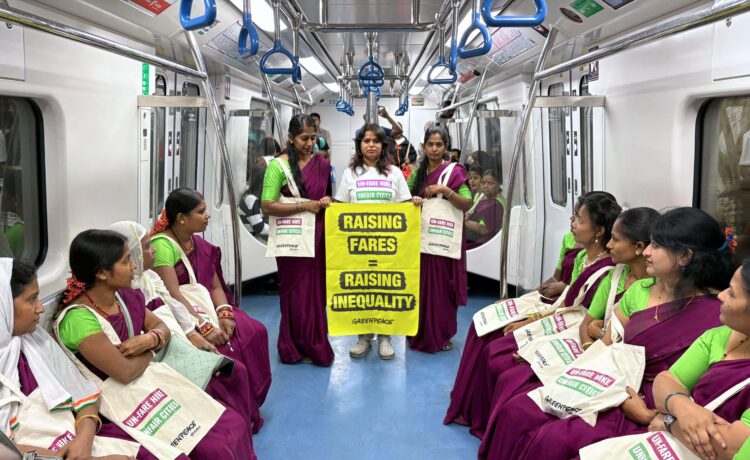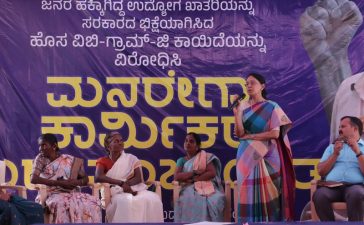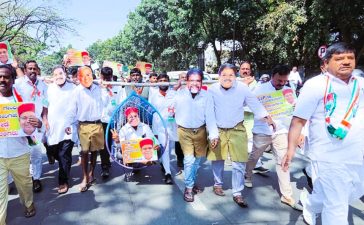Bengaluru Metro Protest Condemns Unjust Fare Hike, Demands Equitable Public Transport
Bengaluru: Outrage and frustration echoed through Bengaluru’s metro system as hundreds of commuters staged a mass protest today, decrying the metro fare hike as unjust and exclusionary. Organized by Greenpeace India, the demonstration spotlighted the growing anguish over spiraling public transport costs that have callously marginalized women, students, and low-income groups. Protesters wielded placards bearing urgent messages such as “Un-Fare Hike, Unfair Cities” and “Metro for People, Profit for Whom?” as they rode from Kengeri to MG Road, demanding the rollback of fare increases that have burdened everyday commuters.
A recent survey by Greenpeace India painted a grim picture of the fare hike’s fallout: 72.9% of metro users now spend as much on transportation as they do on food, while ridership plummeted by 13%, with an alarming 20% drop in February 2025 alone. Particularly disturbing is the survey’s revelation that 38.2% of women have curbed their mobility due to the prohibitive fares, further entrenching barriers to gender equality in public spaces.
Greenpeace India campaigner Aakiz Farooq lambasted the hike, stating, “This fare increase is an affront to the very principles of public service. Public transport must serve the needs of the people, not succumb to profit-hungry motives. At a time when our cities are grappling with severe environmental crises, affordable and efficient mass transit should be a cornerstone of government policy. Instead, commuters are being punished for relying on an essential service. This is unacceptable.”
The fare hike has inflicted widespread suffering, forcing families to reevaluate school choices and compelling low-income workers to resort to more expensive and environmentally harmful modes of transport. This unjust shift exacerbates urban road congestion and contributes to air pollution, with vehicular emissions already a major source of PM10 and PM2.5 particulate matter. In response, Greenpeace India has rightfully demanded that the Bangalore Metro Rail Corporation Limited (BMRCL) reverse the hike and explore sustainable revenue options, such as congestion charges and stricter parking regulations, to promote public welfare instead of profiteering.
One affected commuter, Irene Ann Kuttichira, shared her plight: “Every fare hike is a blow to daily commuters like me. It leaves us in a desperate situation where we must sacrifice essentials just to get to work or college. We need a public transport system that is truly inclusive—one that recognizes the needs of all its users, not just the affluent.”
.jpeg)
The Bengaluru Metro, originally envisioned as an accessible and inclusive lifeline, is fast becoming a symbol of inequity. Each fare increase tightens the stranglehold on vulnerable populations—students, informal workers, women, and even IT professionals—while the authorities appear indifferent to the mounting public despair. Protesters have rightfully demanded that state and central governments take decisive action to reverse these harmful policies and prioritize sustainable, inclusive, and equitable public transport systems.
Statements
- “Affordable public transport is not a privilege—it’s a necessity. The Bengaluru Metro fare hike betrays this principle, leaving commuters to bear the brunt of poor policy decisions.”
- “The metro fare hike is a double blow: economically crippling for vulnerable groups and environmentally reckless as it pushes people back to private vehicles.”
- “Every hike in metro fares is a step away from inclusivity. Public transport should unite, not divide.”
Quotes
- Aakiz Farooq (Greenpeace India campaigner): “Public transport must serve the people, not profit-driven motives. The fare hike punishes the very people who rely on the metro the most.”
- Irene Ann Kuttichira (Metro commuter): “For many of us, the metro is essential. Higher fares force hard choices we shouldn’t have to make. We need equity, not exclusion.”
Participation
- Greenpeace India: Environmental advocacy group leading the protest and pushing for equitable transport policies.
- Aakiz Farooq: Campaigner for Greenpeace India, a vocal critic of the fare hike.
- Irene Ann Kuttichira: A daily metro commuter speaking out against the unaffordable hikes.
- Bangalore Metro Rail Corporation Limited (BMRCL): The authority responsible for the metro system and the controversial fare hike.
Q&A
- Q: What prompted the Bengaluru Metro protest? A: The recent metro fare hike, which disproportionately affects women, students, and low-income groups, sparked widespread anger among commuters.
- Q: What is Greenpeace India advocating for? A: Greenpeace India is demanding a reversal of the fare hike, the introduction of Climate Tickets, and a dedicated public transport budget to ensure affordability and sustainability.
- Q: How have metro fare hikes impacted commuters? A: Many commuters have reduced travel, reconsidered schooling and work choices, and turned to more polluting transport modes, worsening urban congestion and air quality.
The Issue
The recent hike in Bengaluru Metro fares has sparked massive protests led by Greenpeace India. Commuters argue that the fare increase disproportionately burdens women, students, and low-income groups, forcing many to cut down on essential travel and pushing some towards more expensive, polluting transport alternatives. Critics are calling on the government and metro authorities to reverse the hike, prioritize equity, and embrace sustainable revenue measures to protect urban mobility and inclusivity.
.jpeg)
![]()












My brother recommended I would possibly like this website.
He was once totally right. This post actually made my day.
You can not consider simply how a lot time I had spent for this info!
Thanks!